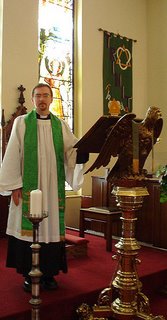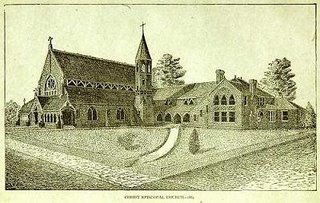
Articles of Religion of the Church of England: XV. Of Christ alone without Sin.
"Christ in the truth of our nature was made like unto us in all things, sin only except, from which he was clearly void, both in his flesh, and in his spirit. He came to be the Lamb without spot, who, by sacrifice of himself once made, should take away the sins of the world; and sin (as Saint John saith) was not in him. But all we the rest, although baptized and born again in Christ, yet offend in many things; and if we say we have no sin, we deceive ourselves, and the truth is not in us."
In light of the recent Anglican-Roman Catholic statement tacitly accepting the Marian doctrine of the Immaculate Conception and the related ideas concerning her bodily assumption into Heaven, as well as in light of the fact that many modern Anglicans are open to these speculations, I think several factors need to be considered pertaining specifically to the Immaculate Conception: 1) This is not a “Catholic” doctrine; it is not accepted by the East nor by the West during the period of the Ecumenical Councils; 2) The Orthodox reject this doctrine, 3) The Old Catholics reject this notion; 4) Early Anglo-Catholics rejected this notion as “un-Catholic” and heretical. Its modern acceptance by many Anglo-Catholics is therefore noteworthy, troubling, and unfortunate. Per the Old Catholic rejection of the Immaculate Conception, the Fourteen Theses state:
"We reject the new Roman doctrine of the Immaculate Conception of the Blessed Virgin Mary, as being contrary to the tradition of the first thirteen centuries according to which Christ alone is conceived without sin."
Early Anglo-Catholic rejection of the notion of the Immaculate Conception is usually tempered by accepting notions of Mary’s perpetual virginity and high degree of sanctity. Even so, Westcott’s statements in his dogmatic theology text Catholic Principles illustrates the continuing problems with the doctrine in a manner similar to the Old Catholic reflection:
"The first example of a papal definition of doctrine made independently of a council occurred in 1854, when, under Jesuit influence, Pope Pius IX declared that the doctrine that the Blessed Virgin was "preserved in the first instant of her conception from all stain of original sin . . . was revealed by God, and is therefore to be firmly and steadfastly believed by all the faithful." We must be careful to note exactly what this doctrine means and involves. Anglican Churchmen do not deny that the Blessed Virgin may have been so sanctified by the Holy Ghost, that she was preserved from actually committing sin, though this is merely a pious opinion; nor do Anglicans dispute the Catholic tradition of the perpetual virginity of the Blessed Virgin. What the doctrine of the Immaculate Conception affirms is, that she did not inherit original sin, a sinful nature, the taint which has been transmitted from Adam; and if this be true, then it would seem to follow that the Blessed Virgin, and not our Lord, is the starting point of our redemption; the beginning of the new humanity, the second Adam; and that the inherited taint of sin was cut off by Mary, not by Christ; and that from Mary we inherit the new nature, rather than from Christ. Now of this doctrine, there is not the slightest hint in the Bible; and when it first began to be taught, it was controverted and disputed. St. Ambrose, St. Augustine, and St. Thomas Aquinas, taught the contrary; and the whole Greek Church has always repudiated it. It virtually contradicts one of our Lord’s unique attributes, namely, that He alone was born without taint of sin. If this doctrine be true, then salvation begins with the Blessed Virgin, rather than with Christ; and yet this doctrine was proclaimed in 1854, as a dogma divinely revealed."
Another point of concern would be that through the Immaculate Conceptions as the Romans teach it that you could argue that Christ's humanity, the humanity he took on in order to redeem it (kai o logoV sarx egeneto kai eskhnwsen en hmin; St. John 1:14), need not be subject to the suffering (hunger, thirst, pain) and death that resulted from the Fall if Mary were cleansed from every taint of Original Sin at her conception and then did not sin throughout her life (was she able not to sin, or not able to sin due to her arguably perfect human nature?).
If Mary is the New Adam (so to speak), rather than Christ, our new nature and redemption is brought to us not by Christ, but by the Virgin: "If this doctrine be true, then salvation begins with the Blessed Virgin, rather than with Christ" (Catholic Principles, Westcott, 1902). Then all of the Roman titles that have been allotted to the Virgin Mary would be accurate and valid and we're bordering on Christological heresy to the point of making Jesus superfluous. In short, the Immaculate Conception is an un-Catholic doctrine that contradicts the Scriptures.











